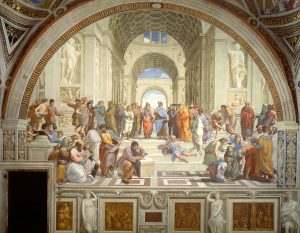The ancient Greek philosopher Plato is one of the greatest thinkers in the history of western civilization. His ideas about education and the perfect state have greatly shaped the modern world. Plato studied under Socrates and recorded the philosophical ideas of his teacher. He founded the Academy, which is believed to be the world’s first institution of higher learning.
Founder of the First University in the World
When Socrates was executed by the Athenian court in 399 B.C., Plato became embittered with the disorderliness of democracy and left Athens. He traveled to foreign lands and studied extensively. When he returned to Athens twelve years later, he established the Academy, which is believed to be the first-ever university in the world. Here, various subjects were taught and discussed, such as astronomy, politics, mathematics, philosophy, and physics. Plato’s most brilliant student, Aristotle, who was another great philosopher, studied in Plato’s Academy for twelve years.
Recorder of Socrates’ Philosophical Ideas
Like Plato, Socrates is considered one of the greatest philosophers of ancient Greece. Some scholars even believe that Socrates is the founder of western philosophy. However, since Socrates was an oral philosopher, he did not write down any of his thoughts. He believed that writing is an unnatural human activity. For this reason, there is no existing document that is written by Socrates himself. Another of Socrates’ students, Xenophon, also wrote about Socrates’ ideas, but most of what we know about Socrates is through Plato’s written works. The most famous of Plato’s works about his teacher is the Apology, which focuses on Socrates’ legal self-defense against the Athenian court.
The Republic
In his work the Republic, Plato outlines the steps on how to establish the perfect society. As a result of his traumatic experience with Athenian democracy, he laid out his theories stating that the masses are uninformed and cannot make intelligent decisions in choosing the right rulers. And so, Plato asserted that only those who are properly educated by the state could rule the people. He further states that there are three kinds of people who should be composing the state: the workers, the warriors, and the philosopher kings. For the past several centuries, the Republic has been one of the most famous political documents in history and has influenced the political life of many nations.
Platonic Love
Plato touched on the concept of love in his work Symposium. In Symposium, a drinking party was held at the house of a poet, and this drinking party was graced by the presence of important men of Athens, including Socrates. Each man put forth his idea of love, and when they were all done, Socrates spoke about love and described it as a ladder. At the bottom step is physical love, the starting point of all kinds of love. At the topmost level of the ladder is the love of wisdom, the highest form of love and concerned with the love of knowledge.
The Theory of Forms
Plato’s Theory of Forms alleges that the real world is just an illusion and that there is a realm that is more real, unchanging and perfect, known as the ideal world. This world of ideas contains the forms from which the objects in the physical world copy their appearance. However, Plato maintains that the physical world is just a shadow of the world of ideas. He expressed this theory in his allegory of the cave, wherein people inside the cave mistakenly believe that the shadows on the wall are reality itself.
Plato’s Theory of Knowledge
Plato believed that ideas are buried inside the soul and that ideas are inborn. He claims that a child who has no existing knowledge can gain and understand knowledge by asking questions. Plato said that this inborn ability to understand concepts is made possible by memories from a past life. According to Plato, when a person learns something during a conversation, he did not actually learn something. Instead, he recalled something. Although these ideas are not popular anymore, they have certainly contributed along the way to the development of theories of learning in psychology.
Mathematics
Plato is famous for being a philosopher, but he was one of ancient Greece’s brilliant mathematicians. When he founded the Academy in 387 B.C, he was already decided that science and mathematics should be used to study the world. At the school entrance, Plato placed a sign that announced, “Let no one ignorant of geometry enter here.” In doing so, the philosopher inspired great thinkers after him to use the science of numbers in understanding the universe.
